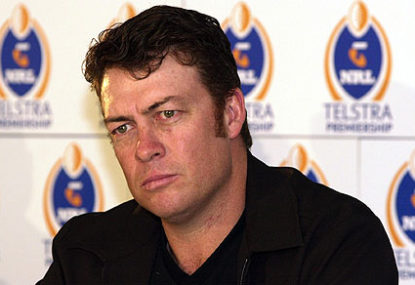Expert

It must have been the coach in Daniel Anderson that convinced him to bend on the obstruction rule this week.
He should have left it as it was and forced the coaches to change the way they structure their attacks.
Some short-term pain would have been worth the long-term gain if it had meant the end of players who were never going to get the ball constantly running into the defensive line.
I even hate the mere term ‘block runner’. It is so not rugby league.
I thought I hated the term ‘batter’ to describe a batsman in cricket, but I must have only disliked that because this makes a whole lot madder.
I’ve spoken before about the sameness in rugby league this season. A lot of people have. Every team looks the same with their approach in attack, it’s just that some teams do it better than others.
Why team A, with obviously less talent than team B, would try to beat team B by playing exactly the same way as it makes no sense.
Unless it is to get lucky, team A is going to lose nine out of 10 of those games.
What is wrong with team A establishing its own identity, and trying something a bit different, which reflects the particular strengths of its players, to beat team B?
Plenty, obviously, because it’s hardly happening.
It took Canterbury coach Des Hasler to mix it up last season, when he had his big forwards running towards the defensive line and passing to each other to challenge the defence.
Even if they were brought down they generally got quick play-the-balls because the opposition couldn’t send multiple defenders at one runner and slow the play-the-ball down.
And that created scenarios in which players like Ben Barba could attack a backpedalling defence on the next tackle.
Of course, Barba was capable of making something happen out of nothing anyway, which is why it is so important to the Bulldogs that he is now back in the game.
The biggest issue for the Bulldogs in last year’s grand final was that they had Kris Keating at halfback and Melbourne had Cooper Cronk.
Keating is an honest player, but the Bulldogs obviously needed more. Had Cronk been playing for them instead, they would have won that game.
But at least Hasler will keep trying to find a way to be genuinely different. How many other coaches are going to do that?
When teams get into attacking positions, I’m sick of seeing every second player run straight past the ball-carrier with no mission other than to reach the defensive line and try to either draw defenders to him or get in a defender’s way.
The way the obstruction rule was for the first four rounds, most tries that were sent to the video referee for a judgement under those circumstances were disallowed.
It didn’t bother me, as long as there was consistency, because it meant that, eventually, we would stop seeing players do that.
But obviously the coaches weren’t going to like it because it affected their plans.
Well, here’s a suggestion: Change your plans to fit in with the interpretation.
But it’s too late now. Because of the change announced by Anderson, video referees are free to decide whether a player without the ball stopped a defender from possibly preventing a try.
Stand by for decisions within that grey area to start causing drama as soon as this weekend.
Anderson erred in an interview on ABC radio last Sunday, when he was talking about the incident in which Brisbane captain Sam Thaiday grabbed hold of referee Adam Devcich’s jumper to make a point in the game against Melbourne.
“I thought he just used him as an example, there didn’t look to be anything in it, but that is gone past our level to the match review. Hopefully it is seen for what it was by everyone,” Anderson said.
I don’t know what “everyone” thought, but I saw it as Thaiday crossing the line, and being disrespectful, and I believe he deserved to be charged.
Anderson, as the referees’ boss, shouldn’t have commented publicly like that.
It sounded to me like Anderson the coach speaking, because I reckon I would struggle to find a coach who thought Thaiday should have been charged.
I think that, overall, Anderson is doing a good job of trying to find solutions to problems.
But he is no longer a coach. He is the boss of the referees now, and that is the only hat he can wear.